#revolutionary girl utena analysis
Text
SA Mention //
The cantarella scene in Utena is so so so good and nearly every bit of it has been analyzed over the years (for good reason!). But can we take a moment to talk about how the music skips?
Right after Anthy suggests she poisoned Utena's cookies. The background music starts skipping. It's an obvious loop too, once you hear it, it's hard to unhear. The music doesn't pick back up until after Utena admits to poisoning the tea, AFTER the spinning red rose. It picks back up at "The tea is delicious".
At the most basic level, the skipping is just another method by which RGU creates emphasis.
But it just. It can't help but remind me of the most significant case of music skipping in the franchise. In Adolescence of Utena, right before E-Ko and F-Ko show the tape of Anthy's assault (another scene which has to do with something being put in Anthy's drink).
So then, the skipping could represent honesty. The brutal, uncomfortable bearing of the truth. Statements that ring in the ears and choices that maybe aren't the most delicate or harmless but had to convey the intended message somehow.
(If anyone else has watched seebeees' video essay on transfeminism in utena [which you should, it's really good], it reminds me of their point on the way Adolescence could be using static to represent Anthy's trauma. Records and CDs skip when something has dirtied them. Scratched them. Damaged them).
It could represent repetition obviously, but it could also represent the exact opposite. A breaking of the cycle, a momentary reprieve from the looping record that is Anthy and Utena's lives at Ohtori. When they confess their love for each other in that moment, in such an odd and uniquely utenanthy way, it catches the narrative off-guard. They are cracking the shell of their egg. Their love is forcing itself through the narrative.
#revolutionary girl utena#rgu#shoujo kakumei utena#sku#utena#utena tenjou#anthy#anthy himemiya#utenanthy#adolescence of utena#rgu meta#utena meta#revolutionary girl utena meta#rgu analysis#utena analysis#revolutionary girl utena analysis#SA mention
772 notes
·
View notes
Text
i feel like touga is the only student in ohtori who's truly doomed...in the movie it's explained that his abuser wanted him to grow his hair long, and in ohtori it's super long, even though he can cut it now. also, in nanami's flashbacks to when they were younger, his hair is short. PLUS in the movie it's revealed that he's already dead. here's how i mix these together: because nanami's arc parallels utena's, not only is touga her prince, but he's also already had that conversion dios had from a genuinely noble person to akio, who can't move on from a traumatic experience to the point where he's made it a part of his identity. that's why the two memories contradict touga's appearance: like utena, nanami remembers touga in an idealistic way, not knowing about what he was actually going through. dios is never coming back; touga's dead. and like akio, he also tries to keep people trapped in ohtori with him (keeping nanami's transfer papers, asking utena to stay with him in the movie).
#touga kiryuu#nanami kiryuu#revolutionary girl utena#rgu#akio ohtori#revolutionary girl utena analysis#utena tenjou#anthy himemiya#tell me if this makes sense
225 notes
·
View notes
Text
You know, the more I watch Revolutionary Girl Utena, the more it just hits me how almost nobody on the student council views Anthy as her own person. The amount of times they all slap her with little to no regard as to how much pain they inflict upon her every time they do so. They see her as nothing more than an object, a prize to be won so that they can gain the power to revolutionize the world.
54 notes
·
View notes
Text
Utena - Analysis on the opening
I don’t know if someone has already done it, but here’s my interpretation of the opening.
Warning: very, VERY long post and mention of scenes from the show, enough to be considered spoilers (sorry 😅)
Edit: I’ve made an analysis on the first ending as well

Let’s live heroically, let’s live with style. (Just a long, long time.)
The opening starts with our two main characters naked and in a fetal position, indicating their status of “newborn” in the story. Then, they are clad in the garbs of their respective roles. Interestingly, despite facing and leaning toward each other, their eyes remain close. In the case of Utena, it symbolizes her inability to see beyond her own narrative of the heroic prince saving the princess. As for Anthy, it’s her resignation to not see anything beyond her role of Rose Bride which she has played for decades/centuries, hence the long, long time.

Even if the two of us are torn apart… (Let go of me…)
…take my revolution.
In the next sequence, not only are they not looking at each other, but they are also back-to-back, another indication that they are positioned to be at odds with each other, whether they want to or not. Still, despite the obstacles thrown at them, despite Anthy’s attempts to make Utena give up on her (“Let go of me…”), the latter doesn’t stop telling her to take her hand (revolution) and that’s what she did.

In the sunlit garden, we both joined out hands.
Miki’s sunlit garden is an idealized memory, so it makes sense to compare Utena’s goal of becoming a prince to the former. Also, the tower, where her journey is supposed to end with her heteronormative “happily ever after”, is where she and Anthy join hands and the latter’s revolution begins.
The sequence where Utena walks with the male students has a “one of the boys” kind of vibe and that might have been the intent. The tomboy character may appear progressive by refusing to conform to traditionally feminine gender norms, but that’s instead a sexist concept because it implies that Utena’s gender, her femininity (and by association, anything branded as “girly”), is the one thing that makes her less than her fellow male schoolmates. Also, she looks over her shoulder, something or someone (Anthy?) catching her attention which stops her from blindly following the other boys’ lead.

Drawing close for comfort, we both swore…
In Anthy’s case, due to her hair and skin color, the vibe she emanates as she walks with her fellow female schoolmates is “not like other girls”, another trope which hurts women by marginalizing the few “different/special ones” from the “normal/average ones” or vice versa. However, the reason she turned around (Utena? Her perspicacity?) is what helps her preserve the part of her identity which is still deep within her. So being different isn’t a bad thing as long as every person, especially girls, are given the same courtesy.
If you read the Japanese lyrics, you would know chikai (from chikau, meaning “to swear/vow”) is at the beginning of Anthy’s sequence, when we see the gates of Ohtori, where she swears to find Utena again.
(Also, did you notice that their respective sequences begin with a shot of where their story in Ohtori ends?)
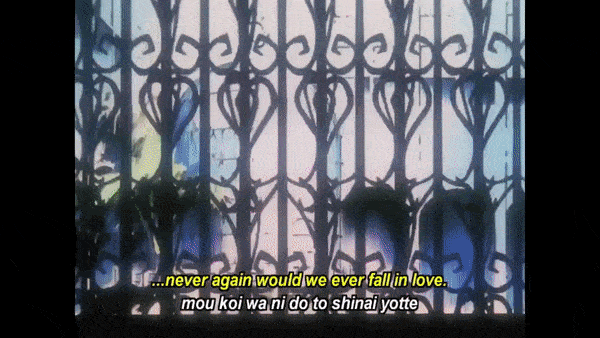
…never again would we ever fall in love. (Every time.)
This line is sung as our two protagonists stand face to face in Anthy’s cage-like greenhouse, where the cycle of the quest for revolution always (re)starts. That vow of never falling in love again, along with that Every time, makes me wonder about how many games had taken place before Utena. How many times had Anthy been engaged to a “chosen one”? How many of those “chosen ones” did she grow to love, yet still choose to betray? How many times did she swore to never love another again only to do so despite said promise to herself? Utena, by ending the cycle, makes the vow mentioned before much sweeter: she and Anthy choose to never fall in love again because they have pledged their love for each other till death do them part (like a married couple 🥰🤵🏻♀️👰🏾♀️🥰).

I see that photo of us standing cheek to cheek…
…and place a bit of my loneliness in our smiles. (Revolution!)
At this moment, the past represented by Utena and Anthy lying down, facing each other, and the future represented by the lyrics paralleled each other.
Past: a (naively) smiling Utena and a (falsely) smiling Anthy -> Anthy gives the white rose, the symbol of the Prince and by association, patriarchy, the source of her eternal pain, to Utena who is unaware of the dark history connected to it -> (failed) Revolution by dueling (transition to the dueling arena)
Future: the photo at the end of Episode 39 -> Anthy’s longing for Utena -> (successful) Revolution by leaving Akio

Even if I dream, even if I cry, even if I get hurt…
…reality keeps on coming recklessly.
This sequence is about the Duelists.
Utena being the one who dreams is self-explanatory.
Saionji, if you pause at the right time, is seen with tears in his eyes. Behind his arrogant attitude is nothing but a mentally weak and insecure boy who throws violent tantrums when things don’t go his way.
Juri is no doubt the one most hurt in the series, not only because of her gender, but also because of her sexual orientation (I’ve made a post about it).
Miki and Nanami being the ones hit by reality makes sense due to the knowledge they idealize the relationship they shared with their respective siblings when they were children.
But what about Touga? Maybe it’s the confidence that he could get the power to revolutionize the (his) world if he emulates the system which had hurt him only to realize that such way of doing things won’t get him closer to his goal. Or, since he’s the first antagonist of the show, giving us a taste of what Akio, another male character whose inside is the opposite of his princely front, could do to girls, maybe he represents the reality/truth of the (imperfect) world.
All these Duelists, these teenagers, fight each other for a purpose and that later turns out to be futile after they find out that the rules they play by are a cover for a much more sinister plot.

I wanna find my own place, the value of being…
The first half, we focus on Utena who raises her sword with a determined look as the blue sky turned golden and the dueling arena crumbled. Utena rejects the narrative Akio wants for her and in the process, breaks the world he has created (and kept Anthy in).
While we zoom in on Utena, symbolizing her will to move forward, it’s the opposite with Anthy. Expression blank, she put some distance between her and Utena/the viewer(s), letting herself (her true self) disappear with Akio’s self-made world.
This sequence foreshadows what will happen in Episode 38.

…the person I’ve been until now…
But as it is shown in Episode 39, Anthy didn’t disappear in the fall of Akio’s world and stood up against her brother (riding a horse), mirroring Utena.
Also, we see Dios opens his eyes as the dueling arena crumbles to dust.
In Episode 13, Akio is conversing with a “sealed” Dios who “glare[s] at” him for wanting to bring the Prince back into the world. Dios had been “sealed away” because playing Prince had been killing him. Anthy had become the world’s sole target of their hatred so that he would no longer carry that great burden on his shoulders ever again. Dios is angry at Akio for not only trying to turn her sacrifice into a fruitless endeavor, but for also taking part in her eternal torment by making her an accomplice in his scheme.
Akio has internalized the teachings of patriarchy. He now idealizes the Prince, forgetting that his current self isn’t the result of Anthy sealing the latter’s power away. He had, of his own volition, casted away his “nobility” and enjoyed the privileges of his gender. He was free of the duties expected from the Prince yet chose to not use that freedom to search for a way to save his sister without taking on that mantle again. Protected by a patriarchal system, Akio is in fact afraid of carrying the weight of the world on his shoulders again despite his desire to return to his “glory days”. He wants to be the Prince again (regression), but also doesn’t want to give up his life of privilege. There is no step toward self-improvement. And that’s why his quest for revolution is nothing but a pretext to play people like a fiddle, especially the vulnerable ones like children and women. I think he subconsciously knows he’s maintaining a perpetual cycle meant to end in failure, but he’s too lost in his self-centeredness to take a third option, to destroy the limits of his coffin. In other words, Akio must let patriarchy (manifested through the game and the dueling arena) disappear in order to regain the lost part of him that is Dios, because what the latter really wants is to live in a better world, one where Princes aren’t needed anymore.

Let’s find the strength to throw it all away.
Strip down to nothing all.
Utena having the strength to throw everything away references her decision to give up on the heteronormative “happy ending” given to her at the cost of Anthy’s well-being.
Anthy being stripped of everything references her true (naked) self within her coffin.
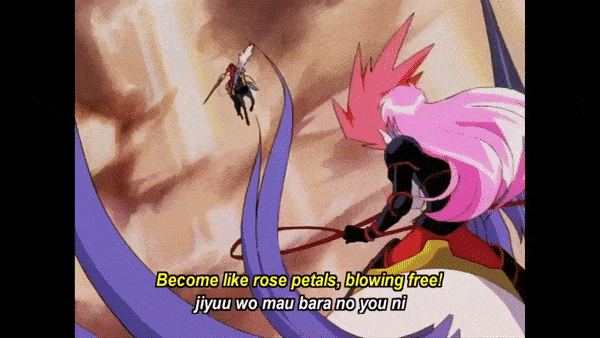
Become like rose petals, blowing free!
Honestly, that part was a bit difficult to interpret. We do see petals blown in the wind when Utena beats boys at basketball, but the only time I saw them concerning Anthy (and by association, the duels) was when the Duelist gets “deflowered”, and I didn’t get a feeling of freedom from it. Or so I thought at first. Knowing that the duels are part of Akio’s plot which is nothing but a wild goose chase, it makes sense in the context that losing means some time away from Akio’s control and thus, a chance to reflect and for self-improvement. Also, if the dueling arena is like a groomed flower, then its rubble is the petals. This might be foreshadowed in Episode 9, when Anthy falls with rose petals scattered everywhere as Utena tries to catch her.
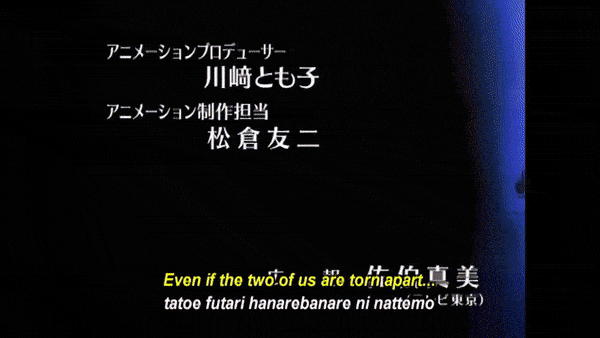
Even if the two of us are torn apart…
…I swear that I will change the world.
We have a return of Even if the two of us are torn apart… (Let go of me…) / …take my revolution. This time, there’s no request to let go of the other party and Utena is taking the next step toward (self-)improvement. If you pause at the right time, you can see she is not in a fetal position like at the beginning of the opening. Now, it looks like she is opening herself to the real world.
Anthy is not present, but that’s because she hasn’t reunited with Utena yet. Until that day comes, the latter will keep fighting for the world both deserve to live in.
In conclusion, the opening is a summary of the entire series and foreshadows how it would end.
#revolutionary girl utena#shoujo kakumei utena#rgu#sku#utena#utena tenjou#anthy himemiya#utena x anthy#anthy x utena#kyouichi saionji#juri arisugawa#miki kaoru#nanami kiryuu#touga kiryuu#prince dios#akio ohtori#revolutionary girl utena analysis#rgu analysis#revolutionary girl utena meta#rgu meta#rondo revolution#mine
117 notes
·
View notes
Text
“In The End, All Girls Are Like The Rose Bride”

What I argue to be one of the most significant lines in Utena is when Anthy says “In the end, all girls are like the rose bride”. It made me think about how the rose bride is just a metaphor for being a girl (I feel like I shouldn’t have to give much reasoning here, because it’s pretty obvious). It made me think about how the rose crest ring and the duels are symbolic for whatever “the system” is. It’s something going on in plain sight, something that tethers people to strict rules (even if they don’t want to follow them), or in some cases unspoken rules, like how Utena always seems to fight the duelists in the same order. It made me think about how, even if Utena dresses like a prince, wields a prince’s sword, and declares herself a prince, as long as she wears the rose crest ring, she will never be a prince.
I think that’s what Anthy was getting at. That no matter how much you try to break out, as long as you stay in that system, you will always be what it designed you to be. The only way to truly cause a revolution is to break out, free yourself from the chains, and start anew with nothing to support you. Utena doesn’t try to break out, even if she’s against what’s happening. She says she’s against it, but she stays within the rules, and tries to bounce off of them, thinking that if she does it, it’s okay because she has good intentions (But then again, you could argue most other characters think that too).
I think it was in this moment, seeing somebody so passionate about what she’s fighting for fall into the same trap every other duelist inevitably finds themselves in is what causes Anthy to say this. I’ve always imagined Anthy was disappointed when she said this. I think that before, she had hope in Utena. She really thought that girl could understand her. But, oh well. In the end, what do you expect?
29 notes
·
View notes
Text
Revolutionary Girl Utena and Neon Genesis Evangelion: Parallels Between Characters and Their Relationships
PREFACE: I wrote this a few years ago and never published it; I was around 15 and I don't think everything I said was entirely accurate, however I do feel like I made connections between these two shows that I haven't seen many talk about, so I'm gonna post it. If anything I say is off, feel free to correct me!
Anyway:
Something I've realized while rewatching Neon Genesis Evangelion is how similar Rei and Gendo's dynamic is to Akio and Anthy's in Revolutionary Girl Utena. Here are some characters and dynamics that I thought were similar, most of them revolving around the characters' connections to Anthy or Rei:
Asuka and Nanami as Antagonists
Anthy and Rei both have very quiet personalities. Both are stoic and appear off-putting to others around them. The characters Asuka and Nanami similarly hold disdain for Rei/Anthy and berate them for being weird.
Nanami harbors jealousy towards Anthy after seeing her in a relationship with her brother. Even though she resents her, the two are both in similar incestuous relationships. Anthy's situation could be a reflection of what could happen to Nanami if she took her relationship with Toga too far. But luckily Nanami realizes that she never really had feelings for her brother, and that she just wanted his validation. But before Nanami realizes all that, she acts as an antagonist to Anthy. She's constantly bullying her, and calling her out for her "weird" behavior. Asuka is similar with Rei. She's not necessarily jealous of Rei but she does project her insecurities on Rei, just look at the elevator scene. She calls Rei a doll for being subservient to Gendo, but she herself is afraid of becoming one. Nanami and Asuka, on the surface, couldn't be any more different than Anthy and Rei, but in reality Anthy and Rei represent a lot of the Nanami and Asuka's insecurities, or reflect the situations they're in.
Gendo and Akio, Both Abusers
Anthy and Rei are both extremely loyal to Akio and Gendo. Throughout each series, they are used to attain Akio/Gendo's goals, with Gendo's being to reunite with Yui and Akio's to maintain power over everyone in Ohtori. Because of how reliant Gendo and Akio's plans are on Rei/Anthy, they both get to know a lot about what's going on behind the scenes in the story, where other characters may not.
Akio and Gendo are very similar to each other, too.
Akio is able to manipulate people using sex. He even sexually assaults Anthy. Anthy endures Akio's abuse for so long that she's scared of leaving him; what if she escapes and finds that the world outside Ohtori is even more cruel?
Like Akio, Gendo also uses sex to control the women around him. He takes advantage of both Akagi and Ritsuko, disposing of them when he no longer needs them, just like Rei fears he will do to her when her use runs out.
Rei exists to obey Gendo. She's a clone, made to serve his desires. Rei wants to leave Gendo, she wants to die but he needs her to achieve Human Instrumentality. All she knows is to be obedient to Gendo, so she continues to follow his orders without considering her own feelings.
Anthy and Rei are cursed to serve Akio and Gendo, and though both dislike their situations, they see no hope of escaping. Not until Utena and Shinji step into their lives.
Utena and Shinji, the Protagonists
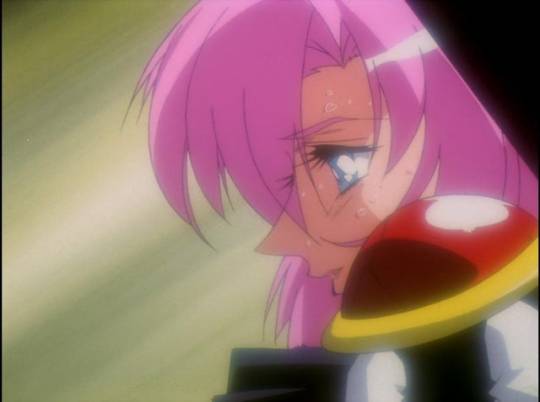
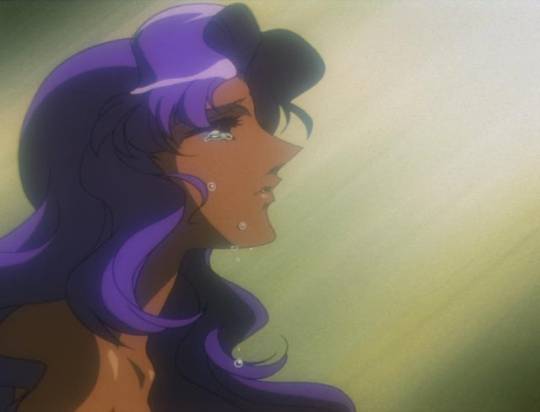
Utena spends the whole series selfishly playing the role of the prince, but once she begins to understand Anthy's situation, she is able to give up princehood and inspire Anthy to leave Akio. Utena doesn't save Anthy, but she gives her the courage to leave her situation, to decide for herself that she wants to leave.
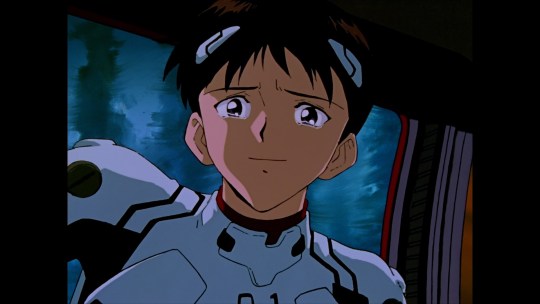

Shinji shows interest in Rei's feelings. He encourages her to express herself, and tells her to smile. While Gendo sees Rei as a disposable clone, Shinji cares about her in a way Gendo never did. He wants her to be happy. While Shinji's motives are still selfish (with Shinji failing to understand Rei, just as Utena still treats Anthy as an object in her attempt to "save her" through the duels), he still shows more concern for her than she's ever experienced from anyone else.
[The scene where Shinji tells Rei to smile visually reminds me of RGU's finale. Shinji looks down on Rei, just as Utena does Anthy. Shinji tries to pull Rei out of the entry plug (the duty she's bound to— being a pilot, being Gendo's servant), as Utena tries to pull Anthy out of her coffin (trapped with Akio, the revolving system of capitalism and patriarchy, as well as literally being stuck in the cycle of abuse).]
Rei chooses to sacrifice herself, and after her death is replaced by her clone Rei 3. Rei 3 carries Rei 2's emotions but doesn't understand them at first. In the End of Evangelion, when Gendo tries to use Rei to start the Third Impact, she rejects him and chooses to start the Third Impact on her own will. (Possibly because of Shinji's influence).
Gendo and Akio Again
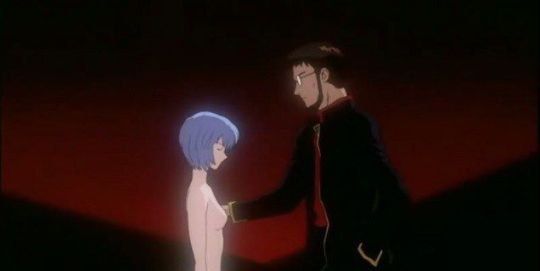
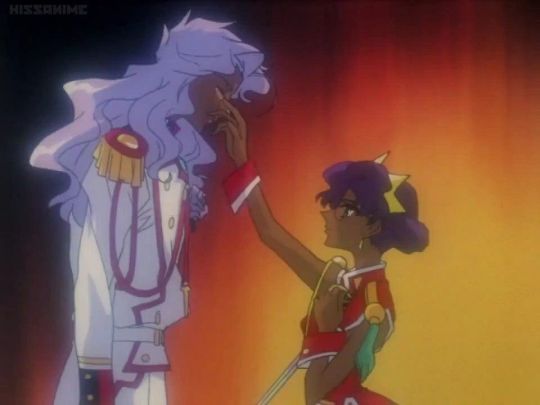
I think the similarities in these scenes are interesting.
Gendo stands over Rei as Akio stands over Anthy— each man exerting power over these girls. Gendo reaches down to grope Rei, trying to control her, and Anthy reaches up towards Akio to comfort him; Akio is using his emotions to manipulate and maintain his control over Anthy.
The lighting in these shots is similar. I don't know how either Anno or Ikuhara meant for the colors used in these scenes to be interpreted. I can only give my interpretation. Red is predominant, especially in the shot from Evangelion. A color that can represent passion. Perhaps this is Gendo's passion for power, for Yui, for eternity? Love and romance are often represented by red, and that includes lust. The red background could show Gendo's lust for Yui— literally in the sense that he's attracted to her as her partner— but most importantly, in the sense that he lusts after her, he desires to return to her. This lust extends to Rei, Gendo's recreation of Yui as well as a vehicle to which he can use to reunite with Yui. [Note: it's implied that Gendo sexually abused Rei, which isn't surprising considering she's a clone of Yui and the way he uses sex to control and manipulate. In the scene pictured above, he gropes Rei's breast— this is right before Rei rejects Gendo and takes the form of Lilith.]
Not only does red represent lust, but also power. It's a bold color, dominating both of these shots. It contributes to the sense of control Gendo and Akio have over Rei and Anthy. Red is used in this context often in Utena. The character Touga manipulates the girls around him in a similar fashion as Akio and Gendo (while also being manipulated by Akio). He manipulates Utena and his sister Nanami, taking advantage of their affection for him (both girls later realizing they never felt for Touga romantically). And Touga's red hair color, like other characters in Utena, signifies this power he holds.
In the RGU shot, red mainly covers Akio. Yellow is also prominent, centering around Anthy. Yellow is most often associated with Nanami in Utena, who represents jealousy— as I mentioned earlier, in her relationship with Anthy—, as well as Nanami's innocence, and perhaps ignorance.
Akio holds control over his Anthy, his victim. Her innocence is highlighted in this scene— she's not ignorant to what's going on, nor is she innocent in that sense. She's informed of and contributes to Akio's system. However, she finds herself trapped in this system, making her Akio's victim. In this sense the innocence in her attempt to comfort him contrasts his desire for power. He knows what he's doing. He cries fake tears. In the climax of RGU, Akio weaponizes his emotions in an attempt to get Anthy to stay. The colors emphasize Akio's power and Anthy's lack of agency in comparison.
Akio is trying to maintain his power over Anthy through these false tears.
Conclusion
Ultimately Gendo and Akio fail to maintain their control. Anthy breaks out of Akio's system, and Rei becomes Lilith on her own accord. It doesn't completely end their goals. Akio's system is still maintained for the rest who chose not to leave, and Gendo is able to reunite with Yui during the Third Impact— even if it is a false perception of her. But their initial plans fall apart, and the characters they've been attempting to manipulate are eventually able to escape. This doesn't just apply to Rei and Anthy, but also the other protagonists— the pilots whom Nerv abuses for their goals, and Utena and any of the other characters who find the courage to leave Ohtori. Evangelion focuses on Shinji's monologue primarily, but the show's message inspires the audience, and by extension the other characters, to live a fulfilling life despite everything. Utena and Anthy both escape Ohtori, but the possibility is there for any of the other characters that question Ohtori (a larger representation of abuse, capitalism, patriarchy, and systems that bind us) to escape as well. Ultimately these characters, these people, these systems don't have as much control as they project onto others. They influence so many aspects of life, but it's not impossible to defy them.
Ok, I've just been incoherently rambling so maybe this post has no point, but hopefully it makes SOME sense. Maybe, maybe you can see what I mean by all of (or at least any of) this. Sorry if this makes zero sense and means nothing. That is, if anyone does see this. But hopefully some enjoy my ramblings
#revolutionary girl utena#neon genesis evangelion#analysis#evangelion analysis#revolutionary girl utena analysis#utena#rgu#evangelion#anthy himemiya#akio ohtori#gendo ikari#rei ayanami#tw: csa#tw: inc*st#tw: abuse
40 notes
·
View notes
Text
dunno if it’s already been said before but it’s fascinating to me that Akio is the only character whose identity and role concretely changes with his name. He was Prince Dios, once, in a better time. He is now Akio, Corrupt Chairman of Ohtori Academy. to the student council, and, for a time, to us, he’s The End of the World, a figure so nebulous and shrouded in mystery they might as well be an abstraction. meanwhile Tenjou Utena and Himemiya Anthy, whose characters also symbolize and embody multiple roles/tropes don’t do that. when Utena transforms into a Duelist, when she’s interacting with Akio or anyone on the stuco, she’s still Tenjou Utena. whether Anthy is playing the part of the Rose Bride or a shy, hapless student, she’s still Himemiya Anthy. from here on is just my interpretation, but i think there’s another layer to this when you consider how the name “End of the World” is an alias that Akio uses to refer to himself. he wants the characters to think there’s nothing beyond him, he IS the world, he is the narrative endgame, and trying to venture past that point is futile. (thinking about the final scene of AoU where anthy and utena LITERALLY escape the world of Ohtori and confront Akio one last time before they do so...)
#rgu#rgu analysis#revolutionary girl utena#revolutionary girl utena analysis#sku#sku analysis#shoujo kakumei utena#shojou kakumei utena analysis#codeword: revolution
160 notes
·
View notes
Text
Why “Wakaba Flourishing” is a Masterful Episode

Source: Episode 20, Revolutionary Girl Utena
By: Beata Garrett | @zhongxia246
It’s difficult to pick one episode of Revolutionary Girl Utena (1997) as my favorite because they all lend weight to the overall story and the themes. Removing one, even the silliest such as “The Cowbell of Happiness,” feels wrong. However, I can safely say that Episode 20, titled “Wakaba Flourishing” is not only one of my favorite episodes, but one that deserves to be rewatched solely by itself for what it brings to the table.
Revolutionary Girl Utena is no stranger to fleshing out its side characters and making even the most unlikeable and shallow-seeming ones complex and fascinating. “Wakaba Flourishing” is special though because Wakaba doesn’t have the same level of a relationship with one of the council members or Utena in the same way as someone like Nanami or Shiori. Wakaba is Utena’s supportive friend, nothing more than that, and that’s one of the aspects that makes Episode 20 so successful. The show understands how it’s depicted Wakaba up to this point and how the audience views her so its focus on her struggles are rooted in that very “ordinary-ness” that she conveyed.
This post is an in-depth look at how “Wakaba Flourishing” peers into the inner lives of the “ordinary” at Ohtori Academy and theories about visual symbols throughout it. If you’ve read my other post, “Why ODDTAXI’s Episode 4 is a Masterpiece” (https://theanimeview.com/2022/01/18/why-oddtaxis-episode-4-is-a-masterpiece/), this post will be similar to that one.
Without further ado, let’s get into why “Wakaba Flourishing” is a masterful episode.
[Editor’s Note: Please assume from this point forward that everything–quotes, images, and summaries–in this post, unless cited otherwise, comes directly from Episode 20 of Revolutionary Girl Utena (1997). This post also goes into spoilers for the entire series. Thank you.]
Disclaimer: This post mentions domestic violence, which may be upsetting for readers, and I highly recommend looking up warnings if you plan to watch the entire show. Please click “Keep reading” if you’re comfortable with this warning.
The episode begins with Wakaba walking to her dorm amidst a voiceover of students talking about Saionji’s recent expulsion from the academy. Near the end of this voiceover, one girl says, “I really had a thing for him for a while there, too” and his previous popularity is made evident–as well as the fact that no one truly cared for him. Amidst this are flashbacks to the duel that caused Saionji to get expelled as he fought Utena and injured Touga when the latter jumped in front of Utena to “save” her.
As the girls continue talking, the show hammers in how pathetic Saionji has become in the eyes of the students and his previous admirers. He’s no longer special to them in the same way that the rest of the student council is. Yet, despite all this, the girls reminisce on how cool he was before he was expelled and wonder where he is now. Using this voiceover at the beginning of the episode conveys just what kind of image Saionji had built for himself at the academy and a larger commentary on the lookism that allowed him to prosper for as long as he did. As the audience, we know Saionji regularly hit Anthy and that his goal was to one-up Touga by achieving something eternal.
However, Saionji’s cruelty was ignored by everyone because he was an attractive boy who was good at kendo and who served on the student council. Even Wakaba, when she and Utena witnessed Saionji hitting Anthy, dismissed his violent tendencies and blamed the victim instead. Unfortunately, Saionji’s reputation hasn’t been completely damaged by his expulsion and instead given him a new air of mystery that works in his favor.

As Wakaba walks home, it’s interesting to note how far away she is from the academy. Unlike Utena and the other council members, she lives off-campus. Her route home takes her down stairs and inclines, symbolizing that even in terms of where she lives, she’s not as special as those who are allowed to live on-campus. It also demonstrates how distant she is from the true core of Ohtori academy and the duels and power struggles that occur there. She lives amongst other “ordinary” people who live their everyday lives away from the academy and the show takes the time to show all of this so the reveal that Saionji is now living with Wakaba is made even more shocking.
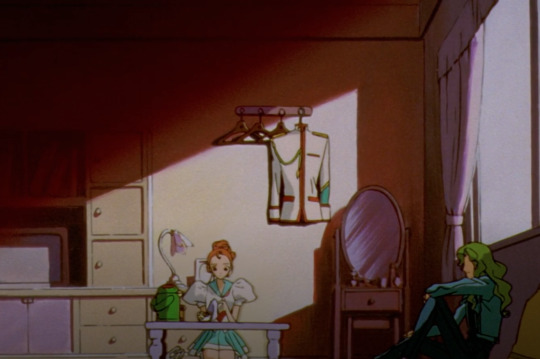
What’s really jarring to me is not Saionji actually living outside the academy, but that he’s no longer wearing his uniform. Costume design is really interesting to look at, especially in a show where the outfits are so homogenous for the most part. Saionji’s new outfit emphasizes how he’s fallen, especially when we see his uniform on a hanger in some shots, but also humanizes him. He’s always been a teenager, but only now does he look like one for the first time.
In the shot above, you can see Saionji’s bag is still there. He hasn’t made himself at home quite yet because he still holds out hope that he’ll return to the academy and regain his place there, but Wakaba’s decision to buy matching cups for them both indicates how serious she is about him and how much she wants him to stay. It’s a recipe for disaster as these two characters are clearly at odds with how invested they are in this relationship.
The Matching Cups
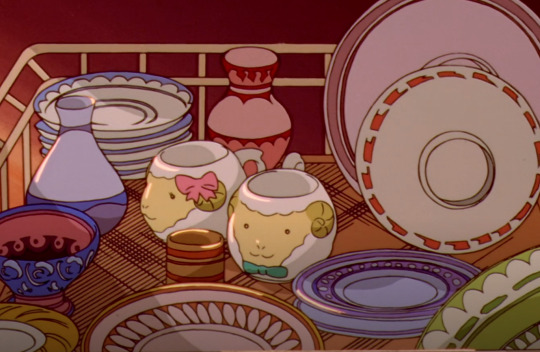
Let’s get more into the matching cups themselves and what they could possibly represent.
First of all, they’re pretty cute and represent Saionji and Wakaba respectively, as seen by the bow on the sheep cup and the green bowtie on the ram one. As I mentioned before, Wakaba buying them indicates how much she wants Saionji to stay despite her agreeing to help him return to the academy. I don’t think she recognizes this desire yet as it’s a subconscious wish until she’s threatened by him actually about to leave and return to the academy (and to Anthy).
The matching cups also indicate to me that Saionji and Wakaba are more alike than perhaps either one would like to admit, and for a reason that may be unpalatable to them both. Sheep and rams aren’t seen as animals that are threatening or special in any way but as submissive, domesticated animals. Despite Saionji seeing himself and being seen by others as special, the matching cups and his role throughout the story is far from being anything special.
At the beginning, Saionji is almost bland and comical in how evil he is and it’s made clear after the first two episodes that he isn’t as big of a threat as the other council members, especially Touga. He’s easily manipulated by those around them and pushed into leaving school. When he does leave, he still believes Touga is a true friend and has his best interests at heart.
Saionji’s naive nature and role in the anime makes the matching cups very appropriate as, in the eyes of the audience, Saionji is ordinary and gullible too. He’s a supporting character who couldn’t even cut it as one of the big villains. By getting matching cups, Wakaba is noticing that the two are similar than he wants to admit and signaling this to the audience.
Manipulations
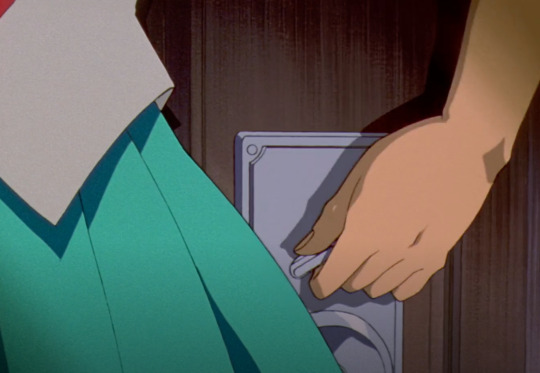
It’s made immediately clear how much Saionji is manipulating Wakaba by playing upon her pity and love for him, but Wakaba isn’t entirely a victim either and is also using him, subconscious as it may be. When Wakaba arrives at the dorm, Saionji greets her. In response, she smiles and quickly locks the door. Wakaba’s first question to him is, “Did anyone come by?” and while it may come off as concern that he’ll be discovered living with her, I read these actions based on the fear that someone will take him away and the desire to keep him to herself.
Throughout the episode, Wakaba calls Saionji her “secret” and there’s a clear pleasure that she gets out of doing so. It makes her happy to feel relied on and she thinks to herself, “he was a distant dream that I thought I could never reach. When you think about it, I never could have had him.” These thoughts are important because they show how Wakaba’s love for Saionji now is partially based on possessing something that was previously unattainable. Despite his cruelty towards others and even her when he posted her love letter for everyone to see, she still helps him out because she wants to be close to him and to be special. Unlike all those other girls at the beginning who wondered where Saionji was, Wakaba knows where he is. In her mind, she’s different from them and has begun to be separated from ordinary people.
On Saionji’s end, he apologizes to Wakaba for still staying in her room but has no intention to leave. I find it funny and sad that Wakaba ignores most of his posturing and his flattery towards her as if she’s heard this before (and probably has), but the moment he pretends he’s leaving, she practically begs him to stay.
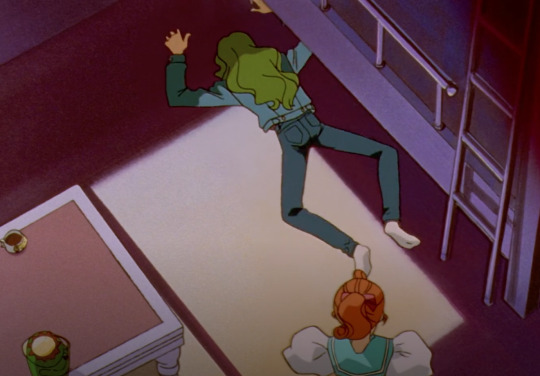
Unfortunately, Wakaba never gets to ask him if he’d like to begin dating as she clearly wants to when they’re interrupted by a fellow student knocking. In one of the funniest bits in the show, Saionji promptly spider crawls away and hides under the bed. When he crawls out, he pretends to be cool again. It’s a ridiculous scene but emphasizes just how in love Wakaba is with him and what he represents that she’s willing to ignore his pathetic moments.
A Special Secret
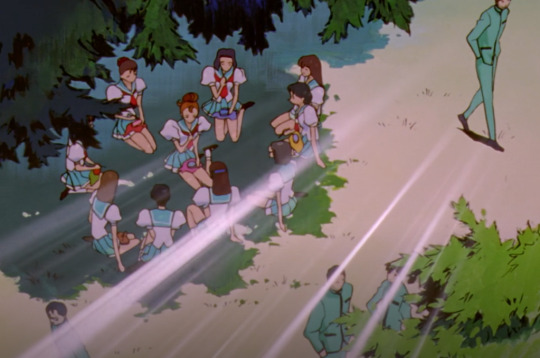
On the surface, Wakaba seems happy, but it’s shown that she’s neglecting other things in her life like hanging out with Utena to return to Saionji at home. Ironically, Wakaba’s desire to keep Saionji with her to make her special, as if some special quality of his will rub off on her, is similar to people’s desire to possess the Rose Bride or Sword of Dios throughout Revolutionary Girl Utena. By possessing both, a duelist is supposed to have “the power to revolutionize the world” yet no one has done it yet. Even Utena doesn’t revolutionize the world by the end of the series.
Saionji doesn’t actually make Wakaba more special, but the show implies that there is some change that comes over her. Utena notices it and asks Wakaba whether something good happened to her, which she laughs off. There’s a montage of Wakaba “flourishing” and doing well in school and, most importantly of all, being the center of attention. One question I’d like to pose though is whether this would’ve happened anyway without Saionji and I truly believe it would have. Rather than it being a case of Saionji transferring some special quality to her, I believe that this is more a result of distancing herself from Utena and of showing us the results of confidence.
When Wakaba is around Utena, Wakaba fades into the background. Even in terms of character design, Utena is meant to stand out amongst everyone, including the student council and we’ve never seen Wakaba around other people without Utena. Perhaps, when not focused on the most “special” person at the academy beside her, Wakaba truly does flourish. It’s also important to note that this kind of flourishing is one that our society typically deems successful–that is, Wakaba flourishes academically and socially, but, like many other successful characters in the series, there remains a fragility beneath this exterior. It’s surface level and built on a shaky foundation.
The Myth of Being Special
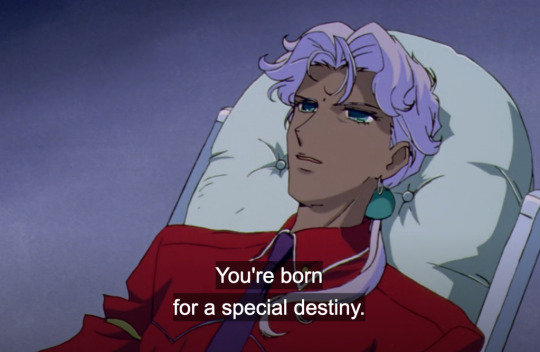
As Utena’s curiosity over Wakaba’s recent change increases, she turns to a recently growing confidante and the true antagonist of the show, Akio. By this point, Akio has successfully charmed her into believing they’re truly friends or that, at the very least, she’s found a caring and trustworthy adult to talk to about her problems. Instead of telling Utena to talk to Wakaba though and communicate in a healthy manner, Akio only isolates Utena more by perpetuating the myth of being special.
Akio even tries to sever Utena’s ability to empathize with Wakaba by telling her, “You wouldn’t understand, would you? You’re born for a special destiny […] Most people exist as one among many. But, given the chance, they can shine as they never have before.” However, he points out that this ability to shine is only temporary though. This talk with Akio reminded me of the ways in which adults burn out children by putting their worth onto their abilities and some intangible thing like being gifted. It’s true that some kids may be more advanced in areas than others, but the special treatment that’s given to them and the conditional worth placed onto them has many negative consequences. A lot of kids labeled as gifted grow older and find themselves burned out by these expectations.
Akio’s speech places Utena on a pedestal, but it also reveals his own arrogance as he clearly believes himself to be special too. When Akio fell from grace as Dios, he still sought power in any way that he could and believed himself to be above all law, including morals, because he was the prince.
Similarly, other characters in Revolutionary Girl Utena believe in this myth of being special that is cultivated at Ohtori and fixate on their relationships or being good at something. For example, Nanami believes that being Touga’s sister makes her special in ways other girls can’t compare to but remains threatened whenever her brother becomes romantically or sexually intimate with someone else. Miki is applauded for his academic intelligence and Juri for her athleticism, yet both are unable to attain happiness and yearn for someone who truly understands them beyond those traits. Being special is not fulfilling, the show seems to tell us, but is actually rather lonely.
One last note I have about this scene is the lighting. I assume the two are talking in Akio’s planetarium and while there is enough light to see them, it’s still pretty dark in there. I believe this is representative of how Akio is misguiding Utena, leading her into the dark if you will, and that despite the stars that Akio is looking at, he doesn’t have any intention of truly enlightening her.
That Leaf Hair Clip and Girls as Meat
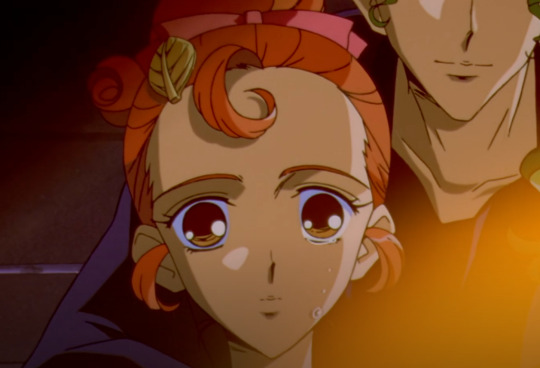
About halfway through the episode, Wakaba comes home one day to find Saionji making a hair clip for her. What’s especially interesting to me is the choice of color and motif for the clip. Roses are so prevalent in Utena, but they belong solely to those connected with Utena’s prince and to the duelists. Wakaba’s hair clip is not any kind of flower, but is a simple leaf in a color not quite gold. Despite this simple gift, Wakaba cries because of it and the hope that it may mean Saionji has feelings for her or is beginning to. To her, the hair clip signifies that she’s almost completed her transformation into being someone permanently special.
However, life is cruel and, as more time passes, Wakaba realizes that Saionji still cares more about Anthy (or the Rose Bride, specifically) than about her. He asks after Anthy while not even looking at Wakaba; it’s as if he can’t either be bothered to or because he’s a coward. For the first time, Wakaba consciously realizes that Saionji going back to school will mean forgetting about her. The hair clip, while nice and still meaningful as Saionji truly did it out of a moment of appreciation, doesn’t erase the fact that he’s still clearly set on Anthy.
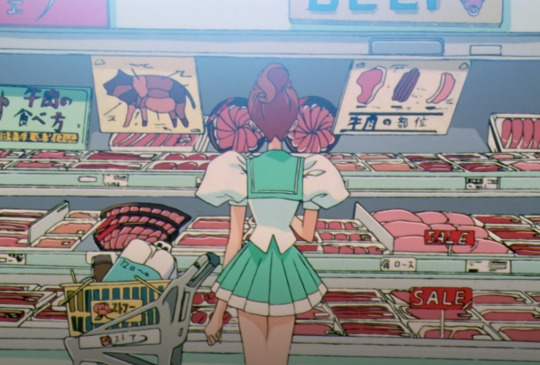
The setting for this realization is at a supermarket. As the Absolute Destiny podcast points out in their great episode on “Wakaba Flourishing,” Wakaba’s grip on the packaged meat she’s holding parallels the tension in that conversation with Saionji. As she presses her fingers against the plastic wrapping, almost but not quite breaking it, the tension in the other scene and their overall relationship is increased.
I also love the supermarket setting because the choice of packaged meat instead of something else brings the animal imagery in the show to mind again.
Throughout the show, girls are compared to animals and have animal counterparts. This is most evident with Nanami, who has a pretty antagonistic relationship with many animals because she doesn’t get along with Anthy, who is an animal whisperer of sorts (similar to witches or princesses having familiars and affinities for wildlife). In “The Cowbell of Happiness,” Nanami is literally turning into a cow and this comes with the realization that she’s actually been treated as livestock for most of her life by her parents and Touga. There’s more cow imagery later with even Utena and Anthy being connected to it through bell earrings and certain poses that call back to “The Cowbell of Happiness.”
In short, the idea of girls as livestock to be used and consumed by the men in their lives who are in a position to hurt them is brought up time and time again. Because of it, I read much deeper into Wakaba’s scene in the supermarket than is perhaps reasonable. I believe setting this realization in the meat aisle and having signs that even point out that the meat is on sale points to how Wakaba realizes that she herself has a limited time to win Saionji over. She is meat that will go bad soon and that is being sold.
Simultaneously, she’s also in a position of power as a consumer buying the meat. In this vein, I read it as the power she has over Saionji as she’s also keeping him like livestock in a sense. It would be easy to see the relationship as one only of Saionji using Wakaba and while I do see it as him manipulating her more, Wakaba is also possessive over him and stops having his best interests in mind. This isn’t to say that she’s the true villain of the episode, but rather to say that she’s been so conditioned to think of herself as unordinary and to value the idea of being special that she is using him subconsciously. During her confession in Nemuro Memorial Hall, Wakaba despairs that “A little longer and I would have changed myself forever.”
The show has told us how important the hair clip is to Wakaba so the loss of it is devastating. While Saionji may have the potential to change, he clearly isn’t going to this episode as he hands the hair clip over to Mikage in return for his expulsion being revoked. Mikage even calls the hair clip “a trifle” and Saionji calls it “that thing.” The words both boys use for this object that means so much to Wakaba tramples over her feelings.
Mikage clearly knows the importance of the hair clip because he uses it to push Wakaba to the edge. Through some kind of magic or collaboration with Akio, Wakaba sees Anthy wearing the hair clip. There are no words exchanged as she watches Anthy walk away, but the look on her face is one of devastating hurt and she ends up in Nemuro Memorial Hall. And, as viewers of the show know, nothing good happens in Nemuro Memorial Hall.
Another interesting word choice for Mikage and Saionji’s conversation is Mikage calling Saionji’s exile “purgatory.” The purgatory that people may be most familiar with (like me) is similar to limbo as a state neither in heaven or hell. Those who go to purgatory must undergo purification before they enter heaven as a kind of punishment. By implying that Saionji’s current state is purgatory, Mikage poses Ohtori academy as heaven and Saionji’s time with Wakaba as punishment rather than a kind girl being taken advantage of by a boy she liked.
Wakaba’s Confession
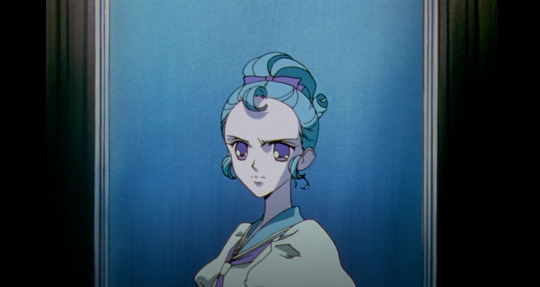
Every confession done in Nemuro Memorial Hall is striking in its own way, but Wakaba’s is painful to me in a way no one else’s is. As she pours out her feelings, she doesn’t blame Saionji for giving the hair clip to Anthy but blames Anthy. Wakaba says, “That girl, with a face that says she alone is special, will steal everything away from me!” In contrast to Anthy as having a special visage, Wakaba denotes herself as “a face in the crowd.” This is painful because she has been a face in the crowd until this episode. The only thing that distinguished Wakaba was her relationship to Utena for viewers of Revolutionary Girl Utena and this adds a meta layer to the confession. While Wakaba’s confession avoids the core issue of the problem, which is Saionji’s treatment of her exacerbating her insecurity, it succeeds in confronting the viewer in how we view those not special enough to get screen time and how this carries into reality (think of how we idolize celebrities and popular kids in school).
When Wakaba leaves Nemuro Memorial Hall and confronts Saionji, startling him, he offers no apologies or thanks. He tells Wakaba, “I’m going back to my old world” as if she doesn’t go to the same school as him. Saionji makes it clear that he has no intention of even acknowledging her once he leaves by stating that he’ll mail Wakaba something more expensive to replace the hair clip.
Wakaba isn’t visibly surprised by any of this at all. She rejects Saionji’s offer and tells him, “I have something nicer now,” showing off her Black Rose duelist ring. During this entire conversation, Wakaba’s face is blank and her eyes are almost dead. It’s a startling departure from her typically cheerful demeanor. She then proceeds to take her sword from his chest. Again, this is part of the typical formula for duels in the Black Rose Saga, but Wakaba’s is striking in how violent it is.
In previous episodes, the Black Rose duelists aren’t as aggressive and the sword that they pull from their victims usually comes out on its own. However, the way Wakaba is animated to rush at Saionji, physically overpower him, and rip the sword from his chest is uniquely hers. It’s the only one in which I see more anger than sadness and feels very appropriate as Wakaba’s feelings for Saionji are very one-sided and as Saionji, who prides himself on his masculinity, is physically overpowered by a girl he deemed weak.
Daily Dose of Shadow Girls
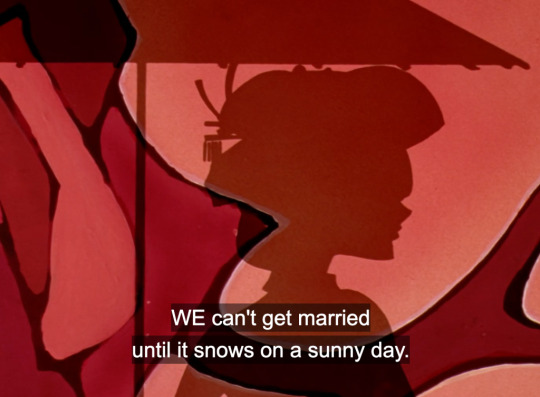
For this episode’s skit featuring the shadow girls, it’s a very short one! My reading of it was that the shadow girls are mocking the ridiculous games that go into dating and relationships in general, but specifically pointing out how girls often get the short end when in relationships with men. It’s also curious that the shadow girls divide themselves into a fox girl and a rabbit girl in a way reminiscent of how girls are either sanctified or demonized. I think this reading has more validity considering the depiction of the rabbit girl in a traditional hairstyle as if she’s presenting herself as more demure before switching to a Playboy bunny outfit. In reality, the rabbit girl is what she is either way but it’s a question of presenting oneself to be appealing enough for marriage.
In response to the conundrum, Utena tells the girls, “Why not just NOT get married?” Interestingly, this is right after the rabbit girl says that these traditions are law for them. Utena’s response is also ironic considering that she is part of this very system. The conditions for being the Rose Bride are just as arbitrary, something Utena even acknowledges at the beginning of the series, but this response demonstrates a certain carelessness to Utena’s character that we’ve seen previously and that will be important in the future.
The Duel

The duel in this episode is my favorite in the entire anime. The finale is a close second. For Wakaba, the tables that show up during duels in the Black Rose Saga are filled with the leaf hair clip in multiple colors. To me, this represents all of the possibilities and potential Wakaba, and potentially Saionji, could’ve had if things hadn’t gone the way they did. The spread of colors is once again reminiscent of how flowers come in all colors when you take natural and dyed ones into account yet leaves are never given the same treatment. Leaves are just seen as accessories, as background characters, to the flowers so seeing them in as many colors as flowers can be read as both touching and tragic. On one hand, Wakaba’s nature as a leaf will never change, it seems to say, yet the leaf is just as worthy and as full of potential as the flower, isn’t it?
As with Wakaba pulling the sword from Saionji, her duel with Utena is vicious and one of the most aggressive in the show. It’s also one of the few times I’ve been afraid that Utena may lose as she takes on the defensive position and refuses to pull the sword from Anthy. Utena still sees Wakaba as a friend, but Wakaba views Utena as an enemy and vents her frustrations with the entire system and Saionji onto her. She scoffs at Utena’s ability to understand her, yelling “You and that girl and the student council, too! You use the special gifts you were born with and, without a second thought, trample the rest of us!” It’s a powerful sentiment because there’s a kernel of truth in there.
There’s an earlier episode in Revolutionary Girl Utena titled “For Friendship, Perhaps” and I feel that this episode would’ve fit that title in some ways. Utena never pulls her sword on Wakaba and uses Wakaba’s own sword to cut the rose on her uniform instead. There’s a pivotal moment when she grabs Wakaba’s hand, acknowledges that she can’t fully understand her but still wants her friend to be happy, and spins her around. While previous duelists have fallen to the floor, signaling they’ve lost and have now been abandoned by the Black Rose Circle, Utena holds onto Wakaba.
Friendship doesn’t fix everything, but I like to think that Wakaba understood that Utena cared for her at that moment. It’s also the second time Wakaba cries in the episode as she finally resigns herself to the understanding that Saionji never cared for her, but that Utena does. To me, it’s pivotal that she cries while looking at the castle that hovers above the dueling arena–it’s as if she realizes how unreachable the ultimate special place is.
Black Rose duelists lose their memories after a duel and it’s significant that they still carry a large portion of the problem burdening them before it afterwards. As Wakaba takes her long walk home, there’s a sense of melancholy as she’s no longer rushing towards Saionji. But there’s also some peace in it as well even if no one is there to welcome her back anymore.
Concluding Thoughts
I feel as if I’ve been writing this post for a long time, but I know there’s some things I missed. This is such a packed episode and shows how successful Revolutionary Girl Utena is at utilizing its formulas and in creating visual imagery. I don’t rewatch the entire show every other month, but this is one of my favorite episodes to put on when that itch comes. There’s no doubt in my mind that “Wakaba Flourishing” is one of the best episodes on Revolutionary Girl Utena.
#Revolutionary Girl Utena#Analysis#RGU#Revolutionary Girl Utena analysis#Shoujo Kakumei Utena#Wakaba Shinohara
313 notes
·
View notes
Text
i have such bad utena brain worms right now but the fucking cars omg. i will never get over them.
At first i thought they represented sex?? but that was during my first re-watch. They represent so much moreeee. They represent Akio’s grooming of his victim’s and the loss of their remaining innocence. Touga and Saionji are still fucking kids. AND AND they still represent sex. In the anime their evil and vile. They most importantly represent Akio’s control over the school. Him getting someone in his car is yes having sex with them but also asserting his control over them. Manipulatiors, abusers, especially groomers are usually after some twisted form of control.
In the movie it’s been reclaimed by the girls it still represents control, but now Utena and Anthy are in control. Their in control of their own stories, they started a fucking revolution. And it reflects in the student council. Them being in a car if their own trying their own escape shows how they finally are getting control as well.
This has all probably been said before but i don’t really care i just needed to get my thoughts out. i love this show so much.
#revolutionary girl utena#rgu#revolutionary girl utena analysis#adolescence of utena#adolescence of utena analysis
109 notes
·
View notes
Text
i love the part in adolescence of utena when prince dios is referred to as the lord of the flies because YEA it means he's been dead this whole time YEA it foreshadows him later being named after the devil but ALSO he's now isolated a bunch of emotionally repressed kids in a place with very little adult surveillance and is making them fight each other to the death for control over their lives and i didn't read lord of the flies three times in a row not to zero in on that
#another far fetched analysis i should make a tag for this#i had to read this book for school on three separate occasions#revolutionary girl utena analysis#revolutionary girl utena#rgu#shoujo kakumei utena#akio ohtori#prince dios#adolescence of utena#sku#actually?? i change my mind this isn't far fetched at all im owning up to it
168 notes
·
View notes
Text
the idea of eternity in utena is so interesting. initially "there is no such thing as something eternal" is the thought that sends utena spiraling into suicidality, which is understandable, since the idea that everything will end someday is terrifying. especially to a child. especially to a child who just encountered one of the most traumatizing and violent "endings" possible, the deaths of her parents. but then she's shown that apparently something can be eternal. and that something is pain, which is even worse, but at least gives her something to live for. and then by the end of the show it's like. no, pain isn't eternal either. "there is no such thing as something eternal" is reframed as a positive. eternity is Not Good. eternity is everything staying the same forever, never changing for the better. it's the opposite of revolution. it's what akio wants, perpetuating the system that benefits him at the cost of everyone else forever and ever. and no matter what utena might have thought, it is not what she wants.
4K notes
·
View notes
Text
Revolutionary Girl Utena episode 7 is really interesting. I love the parallels that the show does between Juri and Utena. In the beginning of the episode, we have both of them agreeing on the fact that dueling for possession of the rose bride is stupid, which surprised me. I didn't think that anyone on the student council would come to that conclusion.
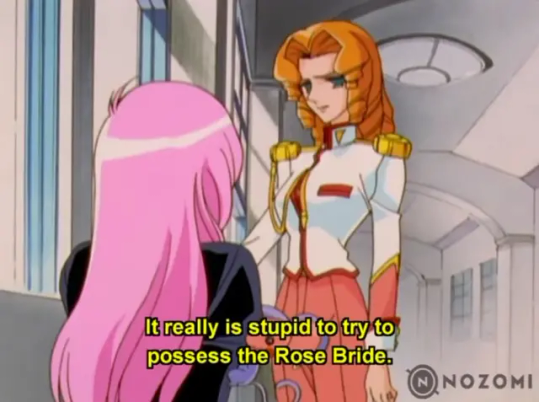
As the episode goes on, we learn more about Juri. We learn that she had a boy that she loved when she was younger, and that there was a girl who she was friends with who also happened to like the same guy. And so because of that, the girl does everything in her power to make the boy fall for her instead of Juri, which is just messed up considering the fact that they were friends. Fast forward to later on that evening, Utena runs into Juri outside. They talk for a while, and Utena tells Juri about why she even has the rose ring to begin with if she finds the whole rose bride fiasco to be stupid. Utena tells her that it's because it's her only connection to a prince that she meant a long time ago. In other words, she's holding onto the ring in the hopes that she'll meet this man again one day. And all of a sudden something inside Juri snaps. She tries to take the ring from Utena and tells her that the ring isn't for her.
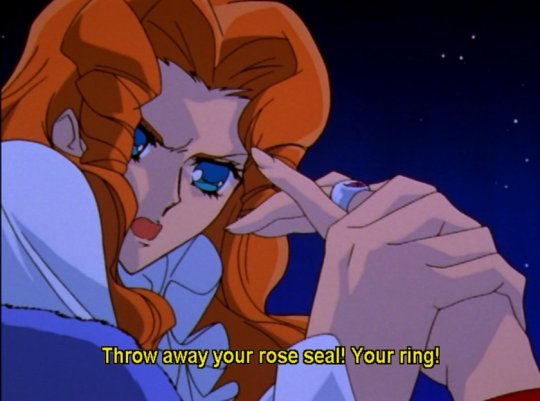

This was the part of the episode that interested me the most, because I immediately knew what Juri was doing, and she probably wasn't even aware of it herself: she was projecting onto Utena in this scene. Projecting her complicated feelings over the boy she lost onto Utena, and seeing Utena as a love struck idiot because that's how she views herself. Utena obviously refuses to give up the ring, so what does Juri do? Challenge her to a fight.
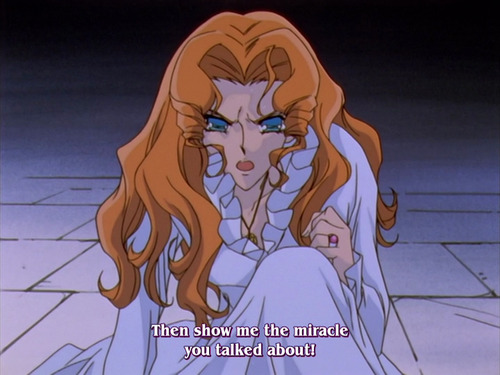
With this fight, she wants to not only take away the ring from Utena, but to also prove a point to Utena (and to herself too from what I can gather): that miracles are bullshit. Why does she think this? Because of what her friend said to her years ago: "If you believe in miracles, your feelings will be known" or something to that effect. This wasn't the case for Juri though, and her feelings are kept locked away. The next day her and Utena fight, with Juri showing just how much of a fierce opponent she is thanks to her fencing skills.


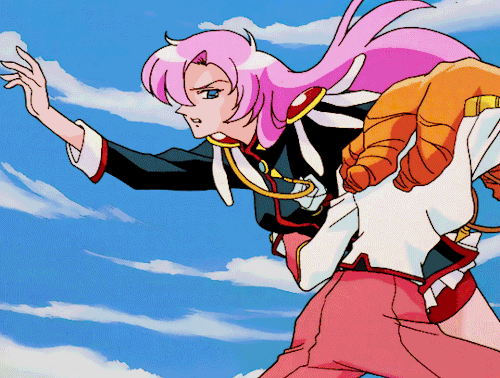
In the end, Juri loses the fight and leaves the arena after dismissing what Anthy told her. Another thing that I love about this episode? Is how they fool you into thinking that Juri was in love with the guy, only to turn around in the end and be like "haha, did we get you? Yeah, she's not in love with him at all, it's actually the girl that she likes!"
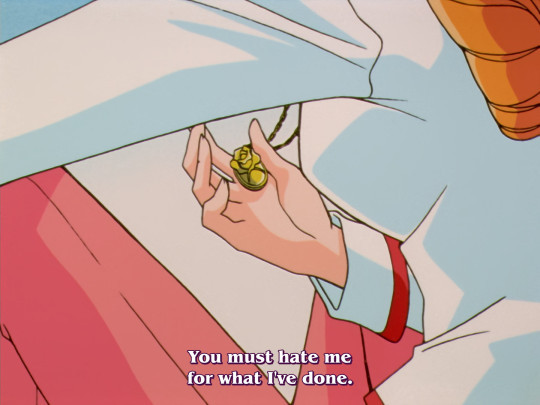

#revolutionary girl utena#utena tenjou#juri arisugawa#Revolutionary Girl Utena analysis#Revolutionary Girl Utena episode 7
48 notes
·
View notes
Text
Utena – Parallels and beyond them
As the series progress, we see that not only Utena’s and Anthy’s respective journeys share similarities, but with the former going through beyond the limits of Dios, she had helped the latter overcome the ones imposed by End of the World.

Once upon a time, years and years ago, there was a little princess, and she was very sad for her mother and father had died.”
“[Anthy] sacrificed herself to save her beloved prince even though she was the only one who truly loved him. And yet, the prince she loves is no longer the prince she knew. Not anymore… He is now End of the World…”
Both are little girls who had experienced a tragedy. The aftermath is glossed over with a fairytale-like narrative and the truth is so much alarmingly darker. Utena was not only grieving, but also losing the will to live and Anthy protected her brother from the expectations of entitled people (and said brother would later become one of them) at the cost of her personhood. Based on the imagery of coffins associated with them, I say both were at that point (symbolically/mentally) stuck between life and death.

Before the princess appeared a traveling prince riding upon a white horse.
“By all means, stay in this cozy coffin of yours and continue to play prince.”
Fairytales present the prince as the perfect man embodying everything a woman supposedly needs to be happy, but as the saying goes, nobody is perfect. Therefore, princes do not exist and will remain a fantasy. While dreaming/fantasizing is not bad, that must not blind us to reality or else we will not see that the Prince Charming riding his white steed is only a patronizing and entitled man-child playing prince on the horse of a carrousel. Utena came to Anthy by taking the most perilous path and with nothing but her determination and her love for Anthy instead of walking on the easy path or by riding a steed to make her journey less arduous.
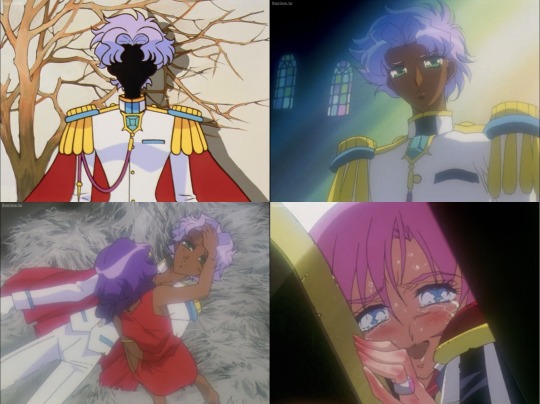
He had a regal bearing and a kind smile.
“Himemiya…at last, we meet…”
The first time Dios appeared before Utena, he had light above him like a halo, giving the viewer(s) the impression of a heavenly entity here to save her which is reinforced with the fact it happened in a church. However, unlike in the fairytale prologue, he didn’t give Utena a kind smile; he only asked her what she was doing in her current position before turning his back to her and leaving. Maybe he knew she would follow him to where Anthy was, but he didn’t appear princely in doing so. Except, that’s the point, isn’t it? In the movie, the prince was the Devil turned into one by Anthy’s power. Dios was actually Akio’s persona. As a prince, Dios MUST have a regal bearing and a kind smile, and MUST present himself like that to EVERY girl in the world (like a Japanese idol). The Prince Charming is not real and no one can reach his level of perfection. By not acknowledging that fact, people’s expectations put immense pressure on boys and they grow to believe that they cannot show their imperfect selves to the world or if they give up, the bitterness of their failure turns them into Akio, men who compensate their inadequacy with superficially cool stuff (cars, stylish clothes) and by oppressing others. However, in doing so, they ruin their chances to form genuine connections with others which explains Dios’s inability to be close to any girl he had saved to the point of not remembering any of their names. The only one whose name he knew was Anthy and she was the only one who saw his true imperfect self. When Utena appeared before Anthy, she came with a light projected from above her too, but it did not give the impression of a higher power like how Dios’s did. Hers was smaller, but it still carried a feeling of hope and liberation. In addition, unlike Dios, Utena didn’t appear regal at all: her dueling uniform was in tatter, her fingers were bloodied and her face was red and sweaty from crying and exhaustion. However, her smile was kind and meant for ONLY Anthy. Utena did not care about how she looked like as long as Anthy got the help she needed and knew how much she loved her.

The prince wrapped the princess in a rose-scented embrace and gently wiped the tears from her eyes.
“Himemiya, give me your hand!”
A kiss from a prince seems to be romantic, but with the true context of Utena’s past, it appears less so. Utena’s tears hadn’t been from mourning for her parents, but from expressing compassion for Anthy who had to suffer for eternity. Faced with her tearfully begging to help Anthy, the Prince just wiped her tears and thanked her for her concern. In the end, he didn’t take away the cause of them and only gave her cold comfort. Tears are seen as a sign of weakness, but also of how humane one can be. After all, Utena’s tears are what reached the Anthy lying in her coffin. If Dios won’t give Anthy a hand, then Utena will do it (and literally at that)!

“Little one,” he said, “who bears up alone in such deep sorrow, never lose that strength or nobility even when you grow up.”
“No! Get out of here! The swords…!”
If we remember how Anthy got the title of witch, you’d see that it was because she had protected the one she cared most even if it meant braving the anger of the entire world; and she’d rather continue her eternal suffering than let Utena become another target of the swords as well. It shows that she possesses as much strength and nobility as Utena (only buried under layers and layers of trauma and bitterness). Both had carried a “deep sorrow” and had been thrown at so many hardships, but that is part of growing up and they had succeeded in overcoming them.
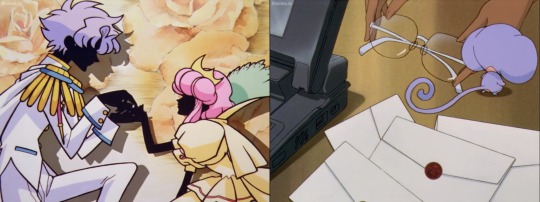
“We will meet again. This ring will lead you to me one day.”
Perhaps the ring the prince gave her was an engagement ring.
“[…] I have to go now. [Utena] isn’t gone at all. She merely vanished from your world.”
Dios and Anthy are sure that a reunion will happen. What makes it interesting is the how. In old time, men gave engagement rings to women not as a romantic gesture, but as an indication that she was now PROPERTY of her fiancé (and isn’t it interesting that we can say the same for the other Duelists, especially the male ones?). As long as Utena wears that ring, she is his to do whatever he wanted. In other words, he had ensured that she would meet him again by physically bounding her to him. Meanwhile, Anthy had nothing but her belief in meeting Utena again, but like Dios said, she needed “a prince she can believe in” only the prince part was unnecessary. Anthy’s position in the first place had been because the prince role was killing her brother. One was dying of exhaustion and the other was the target of everyone’s hatred, both caused by an unjust oppressive system. When both sides are suffering from the latter, then shouldn’t the solution be to change it for something better? So Anthy didn’t need a prince, but someone who can inspire her to believe in the existence of a world beyond her coffin and to walk out of it.
(Do you notice that while the first promise of reunion was made by putting a ring, (a chain) on Utena, Anthy made hers by removing her glasses which symbolized the chain that bound her to Akio?)

[S]o impressed was she by him, the princess vowed to become a prince herself one day.
“I’ll become her prince and save her! […] I swear!”
“This time it’s my turn to go. No matter where you are, I swear I’ll find you. Wait for me, Utena.”
And finally, the mark left by that one meeting. Utena wanted to become a prince because Dios supposedly left an impression on her, but thanks to the MOST BEAUTIFUL plot twist in anime history, we find out that her reason was actually to save Anthy from her eternal torment. Dios did not give back her will to live; she chose of her own volition to leave her coffin in order to help a girl who was eternally suffering in hers. Of course she didn’t remember everything correctly years later and modeled herself after the princely ideal she thought Dios represented, but her subconscious, through the ring, reminded her of the promise she had made to Anthy. Utena turned the ring that symbolizes the patriarchal objectification of women into a mark of female solidarity. Without realizing it, she did more than becoming Anthy’s prince: she became her friend, her support system. And Anthy gradually allowed Utena to occupy a place in her heart. That fondness grew into love and that inspired her to leave Akio and his abusive ass. She also didn’t change her appearance to be like Utena (which had been based after the princely ideal so that would have been a vicious cycle).
They helped each other leave their respective coffins. Anthy may not know everything like Utena in the beginning, but as she progresses in her quest to find her beloved, she will discover the flawed, yet authentic world beyond the fabricated one of Akio/patriarchy.
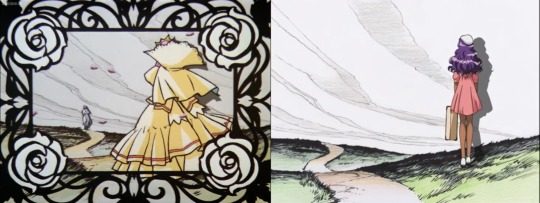
(And fairytale!Utena is just watching Dios riding into the horizon while Anthy is walking forward to reunite with Utena.)
#revolutionary girl utena#shoujo kakumei utena#rgu#sku#utena#utena tenjou#anthy himemiya#anthy x utena#utena x anthy#akio ohtori#prince dios#revolutionary girl utena analysis#rgu analysis#revolutionary girl utena meta#rgu meta#parallels#prince charming#mine
930 notes
·
View notes
Text
Utena Black Rose Arc Elevator Analysis (Case by case)
(Quick context- I’m going to do the rest of the characters, but I wanted to post what I’ve written so far. I’m going to post one character at a time as I do their analysis.)
So, i wanted to take my own jab at analyzing the elevator in Revolutionary Girl Utena. I can’t promise it’ll be the most extraordinary analysis of this scene only because it’s been analyzed a million times (As has everything in Utena, with good reason of course.) I doubt I’m the first person who’s reached this line of thought or chose to analyze these scenes this way, but I still thought it’d be fun.
So, in the black rose arc, every time somebody went down the elevator and told a confession, the picture in the frame would go from butterfly, cocoon, caterpillar, and leaf. I think this is an allegory for how the deeper into the duelist’s motives they get, the less complicated their motives are, as they become exposed as results of more raw emotions such as anger or jealousy. I also believe that the butterfly represents the way the duelist believes the situation is in the outside world, whereas the leaf represents their truest opinion of the situation, which tends to have some sort of shift from what the originally said about it. The subsequent duels are allegories for causing revolution, but rather than being about a historical revolution, I believe it’s in reference to the dilemma that the character revolves around. I thought it would be interesting to look at this case by case.
Kanae:
Butterfly: Kanae explains that she’s engaged to Akio and that she wants to love him, and genuinely likes him as a person. She feels lucky to be as well off as she is. The complication here is that there’s an exception. She doesn’t explain the exception until after the frame is changed from butterfly to cocoon, implying that she tries to hide this.
Cocoon: The only thing mentioned in this stage is that Akio has a younger sister, who Kanae believes doesn’t like her. This could be because there’s something about this information that she feels the need to filter more, whether out of paranoia or some other fear. It is the truth about how she feels, but it’s deeper than that.
Caterpillar: She gives an anecdote about a time she gave Anthy her favorite scarf, and Anthy wiped her glasses with it, despite Kanae being sure she’d told Anthy that wasn’t what the scarf was for. She had grown anxious after Anthy smiled at her, and later her father had gotten sick. She was convinced that Anthy was somehow responsible. Here we can see what seems to be the whole truth, that Kanae is paranoid regarding Anthy. While this in of itself it still very true, it is by no means the rawest layer of these feelings that Kanae has.
Leaf: In the final stage, Kanae finishes by saying she’s tried everything to get Anthy to like her. This reveals the rawest understanding. While Kanae’s reaction to Anthy could be chalked up to mere paranoia, it’s much deeper in the sense that the paranoia was not the origin. The origin seems to be a desire to gets others to like her. This tells us that Kanae is a people pleaser by nature and that her dilemma in life revolves around whether or not people like her. She fights for her desire to be a likable person to others.
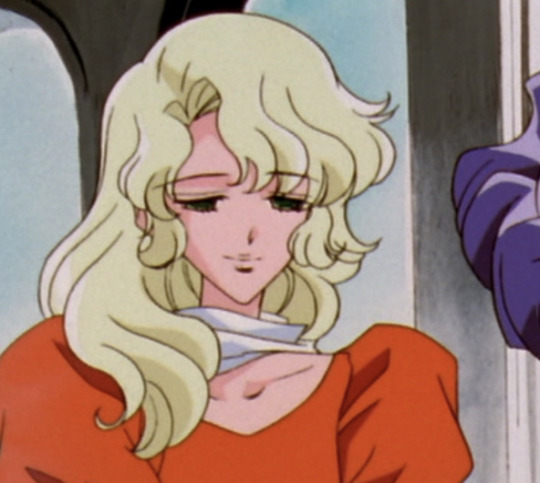
18 notes
·
View notes
Text
Yukio Mishima's House in Ohtori Academy
Lmao Utena fans in 2001 like 'the setting is an anachronistic western style of archi-'



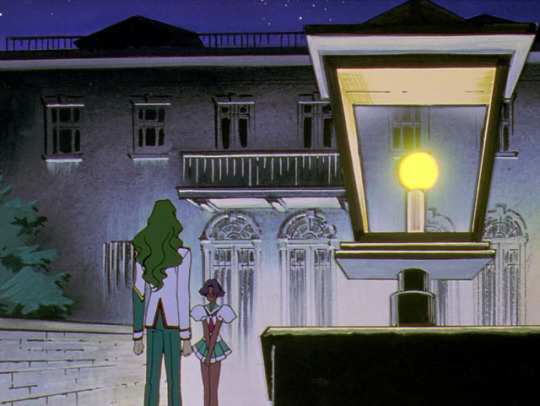

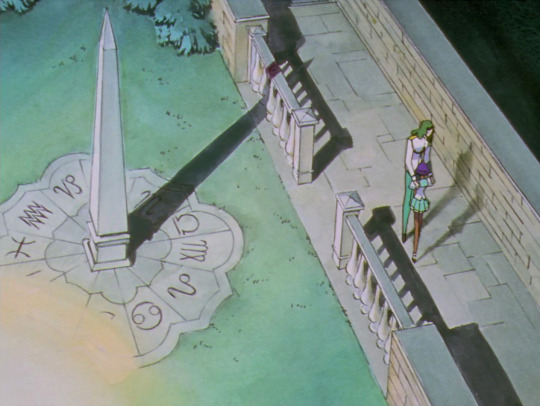

#Utena#Revolutionary Girl Utena#RGU#Sku#Utena meta#Utena analysis#Yukio Mishima#Lmao welcome to the wide world of problematic faves ig
2K notes
·
View notes
Text
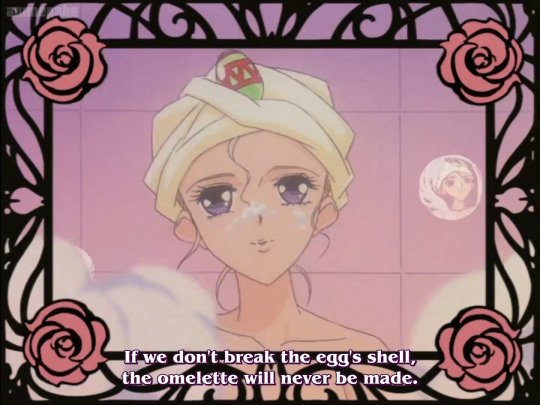
Saw this, thought of the egg speech and now I'm like something something "the difference between the egg being nurtured and provided for so it will grow and someday break out of its shell and take flight" vs "the egg being seen as something only meant for consumption, to be broken and eaten" something something "how children are treated as possessions in our society" something something– [EXPLODES]
#revolutionary girl utena#nanami kiryuu#touga kiryuu#shoujo kakumei utena#sku#rgu#utena analysis#Of course‚ there's also the whole birdcage symbolism to consider too but I better slow down now or else– [EXPLODES AGAIN]#ambi utena post
612 notes
·
View notes